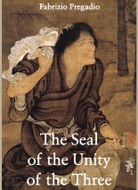The Lovely Maid of the River
The Seal of the Unity of the Three (Cantong qi), Poem 68
Reproduced from:
Fabrizio Pregadio
Golden Elixir Press, 2011
Paperback ● Hardcover ● PDF (abridged)
Under an allusive poetical language and thick layers of images and symbols, the Cantong qi hides the exposition of the teaching that gave origin to Taoist Internal Alchemy (Neidan). In addition to a complete translation, this book contains a detailed introduction to the history and teachings of the Cantong qi, explanations of each of its sections, and notes on its verses.
 This page is part of a series on the Seal of the Unity of the Three. See the complete index.
This page is part of a series on the Seal of the Unity of the Three. See the complete index.
Text
河上姹女、靈而最神。得火則飛、不見埃塵。 5 鬼隱龍匿、莫知所存。將欲制之、黃芽為根。
Translation
| 1-4 | The Lovely Maid of the River |
| is numinous and supremely divine: | |
| when she finds Fire she flies away, | |
| leaving behind not a speck of dust. | |
| 5-8 | Like a demon she hides, like a dragon she conceals: |
| nobody knows her whereabouts. | |
| If you want to control her, | |
| the Yellow Sprout is the root. |
Notes to Poem
The Lovely Maid of the River (heshang chanü) is True Mercury; she is the Yin line within Li ☲, referred to as the "second daughter" in the terminology of the Book of Changes. Aroused by fire, she escapes and flies away. Only the Yellow Sprout (huangya), which is True Lead, can hold her. When they meet, they join and generate the Elixir.
Translations from the The Seal of the Unity of the Three
● The Lovely Maid of the River
Related pages
The argument poetically expressed in these verses resounds at different levels and can be understood in different ways. From the perspective of the Cantong qi, all of them are instances of one and the same principle. In a material sense, the Lovely Maid of the River can be mercury, which escapes (volatilizes) when it is heated by fire. In a spiritual sense, referred to the human being, the Lovely Maid can refer to sentiments and passions. When one's own Fire is used to stimulate those sentiments and passions, they escape and run uncontrolled. When they are presided over by one's own True Nature (Lead, the Yellow Sprout), they turn into qualities — instincts, intuitions, propensities — that express one's Nature.
© Fabrizio Pregadio and Golden Elixir Press 2023






